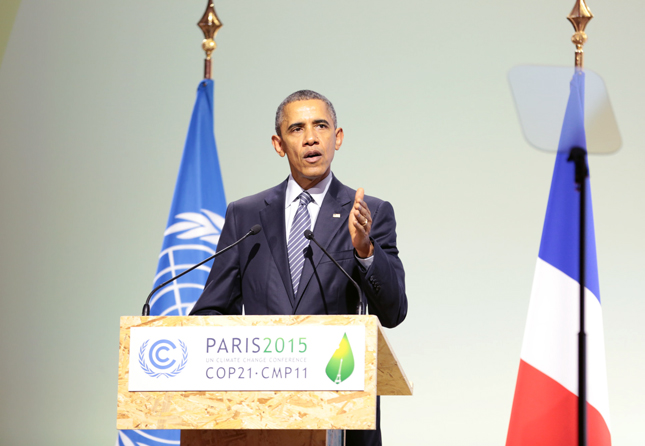-
Tracking National Security in the Paris Outcome
December 16, 2015 By Carley Chavara
Security was inseparable from the climate talks in Paris, from the safety of conference participants to how climate change impacts the stability of nations.
Though the “Paris Agreement,” as the resulting document of this summit is called, does not directly reference national security, the urgency for nations to adapt to the dangers of climate change is clear, and world leaders repeatedly mentioned security in their remarks throughout the process.
The effects of a changing climate can cause “political disruptions that trigger new conflict and even more floods of desperate peoples seeking the sanctuary of nations not their own,” said President Obama during his opening speech.
“If we let the world keep warming as fast as it is…we are going to have to devote more and more and more of our economic and military resources not to growing opportunity for our people, but to adapting to the various consequences of a changing planet,” he said later in the week.
To French President Francois Hollande, the fight against terrorism and the fight against global warming are both important responsibilities for future generations. At Paris, he spoke about how climate change can cause migration and add to conflict as leaders are unable to provide food and water to their citizens.
“This one trend affects all trends”
Perhaps the most oft cited example of climate-related conflict is the Syrian civil war, where severe drought is thought to have exacerbated poor governance and escalated existing sociopolitical tensions. Still, causal pathways from climate change to conflict are complex.
Obama defended his commitment to climate change amid terrorist threats, explaining that “this one trend – climate change – affects all trends,” and calling climate action “an economic and security imperative.”
Secretary of State John Kerry has referred to climate change as a “threat multiplier” and took initiative in the weeks before COP21 to create a State Department task force that will integrate climate change and security analysis into foreign policy planning.
Fragility concerns have been previously addressed by multilateral development banks and the Organization for Economic Cooperation and Development. An independent report commissioned by the G7 foreign ministers and co-authored by the Wilson Center outlines seven risks for fragile states that are compounded by climate change. These include local resource competition, livelihood insecurity and migration, and sea-level rise.
Through a sovereignty lens, sea-level rise poses an enormous security threat to island nations and low-lying areas. “Climate change is a threat to their very existence,” said Obama in Paris. Thanks to lobbying on behalf of the Alliance of Small Island States, the Paris Outcome features an entire section on “loss and damage,” confirming support for Warsaw International Mechanism for Loss and Damage, which could provide a way to compensate places that are rendered uninhabitable.
Perhaps one of the most important changes within the new climate agreement is how responsibility for climate action between richer and poorer nations is framed. The now infamous concept of “common but differentiated responsibility” from the Kyoto Protocol, which places more emphasis on developed countries to make up for their historical emissions and wealth, has been shifted to “dynamic differentiation” in the text.
The dynamic differentiation framework recognizes there is more to climate responsibility than the income of a given country at the time a treaty is signed. It welcomes voluntary measures from developing nations, many of which have already pledged emissions reductions and investments in adaptation. However, it also allows countries to make adjustments to their commitments if circumstances and capabilities change. This may be particularly important for fragile and conflict-affected countries. The delegate from Ukraine, for example, pointed out that violent upheaval has changed his country dramatically since its classification as a developed country under the Kyoto Protocol.
An ambitious and coordinated international response to climate change is merely one piece in a much larger global security puzzle, said Obama in remarks, and cooperation between nations is key.
“Whether it’s organizing the coalition that’s fighting ISIL or dealing with climate change, our role is central,” he said. “But on large international issues like this, it’s not going to be sufficient… We’ve got to have partners.”
“In some ways, it’s akin to the problem of terrorism and ISIL. In the immediate aftermath of a terrible attack like happened here in Paris, sometimes it’s natural for people to despair. But look at Paris. You can’t tear down Paris because of the demented actions of a handful of individuals. The beauty, the joy, the life, the culture, the people, the diversity – that’s going to win out every time.”
Carly Chavara is a Masters student at the American University School of International Service Global Environmental Politics Program. She attended the 21st Conference of the Parties to the UN Framework Convention on Climate Change in Paris from November 29 through December 4.
Sources: Adelphi, Center for International Sustainable Development Law, A New Climate for Peace, Organization for Economic Cooperation and Development, UN Framework Convention on Climate Change, The White House, World Bank.
Photo Credit: President Barack Obama speaks in Paris on November 30, 2015, courtesy of the UNFCCC.
 A Publication of the Stimson Center.
A Publication of the Stimson Center.






